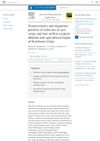 61 citations,
May 2010 in “Integrative Cancer Therapies”
61 citations,
May 2010 in “Integrative Cancer Therapies” There is no clear recommendation for using selenium in cancer patients; it may be beneficial to correct low selenium levels before treatment.
April 2017 in “The FASEB journal” Low selenium levels worsen health but increase lifespan in mice.
 February 2023 in “European journal of geriatrics and gerontology”
February 2023 in “European journal of geriatrics and gerontology” Selenium helps prevent thyroid issues and cognitive decline in the elderly, but balance is key.
[object Object] 
Selenium can be toxic to animals, causing serious health issues, especially in horses.
 April 2024 in “Research Square (Research Square)”
April 2024 in “Research Square (Research Square)” Selenium supplements can help improve symptoms and metabolic markers in lupus patients.
 79 citations,
January 2017 in “Dermatology practical & conceptual”
79 citations,
January 2017 in “Dermatology practical & conceptual” Correcting nutrient deficiencies may help with hair loss, but the benefits of supplements without a deficiency are uncertain and could be harmful.
 78 citations,
December 2011 in “Clinical toxicology”
78 citations,
December 2011 in “Clinical toxicology” Excessive selenium from a supplement caused toxicity but patients recovered with care.
 73 citations,
July 2016 in “Cosmetics”
73 citations,
July 2016 in “Cosmetics” Mushrooms have beneficial properties for skin and hair care products and have great potential for future cosmetic use.
 71 citations,
September 2007 in “Cancer”
71 citations,
September 2007 in “Cancer” Prostate cancer prevention includes diet changes, supplements, and medications, with more answers expected soon.
 57 citations,
July 2005 in “Genetics”
57 citations,
July 2005 in “Genetics” Key genes are crucial for Drosophila wing development and could be insecticide targets.
 22 citations,
August 2019 in “Environmental research”
22 citations,
August 2019 in “Environmental research” Pseudomonas sp. T5-6-I bacteria increase selenium uptake in Brassica oleracea plants by 130%.
 18 citations,
September 2011 in “Livestock science”
18 citations,
September 2011 in “Livestock science” Maternal Nano-Se supplements improve fetal hair follicle development in cashmere goats.
 16 citations,
May 2019 in “Hormone and Metabolic Research”
16 citations,
May 2019 in “Hormone and Metabolic Research” Selenium might help with insulin resistance and cholesterol in PCOS, but more research is needed to confirm its benefits.
 10 citations,
April 2019 in “Environmental Science and Pollution Research”
10 citations,
April 2019 in “Environmental Science and Pollution Research” Eating selenium-rich rice improved antioxidant activity and signs of aging in mice.
 5 citations,
March 2018 in “Advances in integrative medicine”
5 citations,
March 2018 in “Advances in integrative medicine” A 23-year-old woman with Hashimoto’s thyroiditis improved significantly after a 15-month integrative treatment plan.
 3 citations,
November 2020 in “Biological Trace Element Research”
3 citations,
November 2020 in “Biological Trace Element Research” Men with hair loss may lack zinc, copper, and vitamin D; supplements could help.
 1 citations,
February 2021 in “Animal feed science and technology”
1 citations,
February 2021 in “Animal feed science and technology” Organic selenium may offer better retention and less waste in puppies.
 1 citations,
November 2015 in “Lʹvìvsʹkij klìnìčnij vìsnik”
1 citations,
November 2015 in “Lʹvìvsʹkij klìnìčnij vìsnik” Correcting trace element imbalances may help reduce alopecia areata symptoms.
 1 citations,
September 2013 in “Elsevier eBooks”
1 citations,
September 2013 in “Elsevier eBooks” Hair ages and thins due to factors like inflammation and stress, and treatments like antioxidants and hormones might improve hair health.
 1 citations,
January 2010 in “Springer eBooks”
1 citations,
January 2010 in “Springer eBooks” Certain micronutrients may improve hair and nail health, but more research is needed to confirm their benefits.
 April 2024 in “Cell death and differentiation”
April 2024 in “Cell death and differentiation” Cell death shapes skin stem cell environments, affecting inflammation, repair, and cancer.

Wound healing is complex and requires more research to enhance treatment methods.
 February 2024 in “Journal of Geochemical Exploration”
February 2024 in “Journal of Geochemical Exploration” Selenium levels in soil, crops, and human hair in Northwest China are within safe limits.
January 2021 in “Agrobiological records” Biofortifying fruits and vegetables with selenium can improve dietary intake and prevent health issues.
[object Object] 30 citations,
September 2016 in “Aging Cell” Low selenium levels can extend lifespan but worsen health issues.
11 citations,
January 2016 in “BMC veterinary research” Urinary Se to creatinine ratio, serum Se, and glutathione peroxidase are effective early biomarkers for selenium status in dogs.
5 citations,
July 2019 in “Nutrients” Low selenium intake may delay puberty in boys but not in girls.
1 citations,
December 2019 Selenium is essential for health, but too much or too little can cause problems; blood selenium levels are a good measure of intake.
 30 citations,
January 2023 in “EFSA journal”
30 citations,
January 2023 in “EFSA journal” Adults should not consume more than 255 micrograms of selenium per day to avoid risk of hair loss and other side effects.
 7 citations,
December 2020 in “Endocrine-related Cancer”
7 citations,
December 2020 in “Endocrine-related Cancer” The over-the-counter supplement DHEA could make COVID-19 worse, especially in diabetics and people with G6PD deficiency.
























